Guest blogged by Ernest A. Canning
In her Sept. 9 decision [PDF] in Log Cabin Republicans vs. United States, U.S. District Court Judge Virginia A. Phillips, a 1995 Clinton appointee, determined that "Don't Ask, Don't Tell" (D.A.D.T) is unconstitutional as it violates First Amendment rights even within the more restrictive confines of military speech.
The court rejected the government's argument that Log Cabin Republicans lacked standing to initiate the action, noting that at least one member of the group, John Nicholson, was discharged from the armed forces because of "Don’t Ask, Don’t Tell.” It expressly found that D.A.D.T "does not significantly further the government’s interest in military readiness or unit cohesion," and directed plaintiff's counsel to prepare a "Proposed Judgment, including a Permanent Injunction" by no later than Sept. 16.
Whether the Eric Holder Justice Department will appeal, despite President Obama's pledge to seek a repeal of D.A.D.T., is an open question...
For the military, D.A.D.T. was a self-inflicted wound
In her decision, Judge Phillips not only pointed to official statistics revealing that some 13,023 members of the U.S. Armed forces had been discharged under D.A.D.T. between 1994 and 2009, but to the testimony of Dr. Lawrence Korb which reflected that D.A.D.T. produces an annual loss of approximately 5,000 via loss of recruiting and decisions not to re-enlist; that, for every service member discharged after ten years of service, six new members must be recruited to recover the lost level of experience.
The court observed:
Hypocrisy of D.A.D.T. exposed
The court noted that after 2001 even as the military was enforcing D.A.D.T., it began admitting convicted felons under "morals waivers." It also pointed to the hypocrisy in the Department of Defense practice to delay discharge proceedings until after the service member completed an overseas combat mission and was redeployed in the U.S. --- a delay that "undermined" the government's claim that D.A.D.T. "served the interests of military readiness and unit cohesion."
Breathtaking scope of intrusion into Service Members' First Amendment Rights
In a single paragraph, Judge Phillips summed up the scope of D.A.D.T.'s overreach.
Fundamentally different rationale used here as compared to finding that CA Prop 8 same-sex marriage ban unconstitutional
It is important to avoid reading too much into this decision.
Judge Vaughn Walker's Aug. 4, 2010 decision, which found California's ban on same-sex marriage to be unconstitutional, was decided on Equal Protection grounds. In this case, Judge Phillips' decision reflects that she previously dismissed an Equal Protection argument presented by the Log Cabin Republicans.
Thus, this case does not stand for the proposition that exclusion of homosexuals from military service is unconstitutional. It merely establishes that if homosexuals are to be permitted to serve, a statute which permits them to be discharged because the content of their speech reveals their homosexuality violates the First Amendment.
Ball is in Eric Holder's Court
Once the court issues its injunction, the Justice Department has a right to appeal. If it allows the decision to become final without an appeal, the D.A.D.T. will be swept into the dustbin of history. If the Justice Department files an appeal, it would likely seek a stay of Judge Phillips' ruling pending the outcome of the appeal.
Given the President's promise to seek a repeal of D.A.D.T., a challenge to this well-reasoned opinion would make no sense politically, economically or morally. But then, given the Department's track record in such matters as defending the abhorrent state secrets doctrine and extraordinary rendition, nothing it did at this point with respect to D.A.D.T. would shock me.
Ernest A. Canning has been an active member of the California state bar since 1977. Mr. Canning has received both undergraduate and graduate degrees in political science as well as a juris doctor. He is also a Vietnam vet (4th Infantry, Central Highlands 1968).


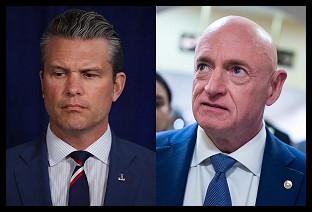 Court Blocks Hegseth Censure of Sen. Mark Kelly
Court Blocks Hegseth Censure of Sen. Mark Kelly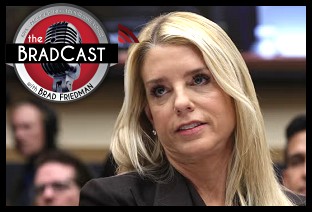 Harpy Tantrums, Legal Losses, Election Fails, Retreating ICE and Other Hopeful Signs: 'BradCast' 2/12/26
Harpy Tantrums, Legal Losses, Election Fails, Retreating ICE and Other Hopeful Signs: 'BradCast' 2/12/26 'Green News Report' 2/12/26
'Green News Report' 2/12/26
 'Let Kids with Asthma Suffer': Trump to Reverse EPA's Landmark 'Endangerment Finding': 'BradCast' 2/11/26
'Let Kids with Asthma Suffer': Trump to Reverse EPA's Landmark 'Endangerment Finding': 'BradCast' 2/11/26 Trump's Presidency Now About Little More Than Racism, Corruption, Culture War Nonsense: 'BradCast' 2/10/26
Trump's Presidency Now About Little More Than Racism, Corruption, Culture War Nonsense: 'BradCast' 2/10/26 'Green News Report' 2/10/26
'Green News Report' 2/10/26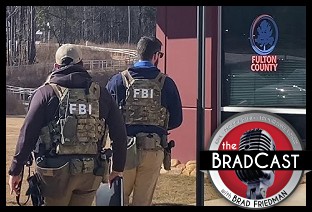 About Trump's FBI Raid of the Fulton County, GA Elections Warehouse: 'BradCast' 2/9/26
About Trump's FBI Raid of the Fulton County, GA Elections Warehouse: 'BradCast' 2/9/26 Sunday 'Dead in Darkness' Toons
Sunday 'Dead in Darkness' Toons 'New START' Treaty Allowed to End Amid New World Disorder: 'BradCast' 2/5/26
'New START' Treaty Allowed to End Amid New World Disorder: 'BradCast' 2/5/26 'Green News Report' 2/5/26
'Green News Report' 2/5/26 Trump Turns 'War on Terror' Tools Against Domestic Political Foes: 'BradCast' 2/4/26
Trump Turns 'War on Terror' Tools Against Domestic Political Foes: 'BradCast' 2/4/26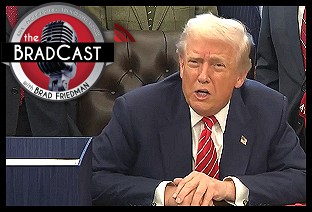 Losing Legally and Politically, Trump Threatens to 'Nationalize' Elections: 'BradCast' 2/3/26
Losing Legally and Politically, Trump Threatens to 'Nationalize' Elections: 'BradCast' 2/3/26 'Green News Report' 2/3/26
'Green News Report' 2/3/26 Bad and Good Bunnies, and an Electoral Shock in Deep 'Red' TX: 'BradCast' 2/2/26
Bad and Good Bunnies, and an Electoral Shock in Deep 'Red' TX: 'BradCast' 2/2/26 Sunday 'Mirror, Mirror' Toons
Sunday 'Mirror, Mirror' Toons 'Green News Report' 1/29/26
'Green News Report' 1/29/26 It's About Elections and the Windmills of His Mind: 'BradCast' 1/29/26
It's About Elections and the Windmills of His Mind: 'BradCast' 1/29/26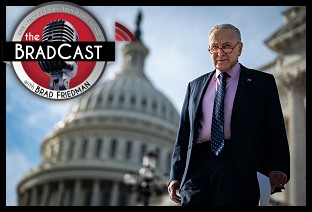 Govt Shutdown Over ICE Funding Near Certain This Weekend: 'BradCast' 1/28/26
Govt Shutdown Over ICE Funding Near Certain This Weekend: 'BradCast' 1/28/26 Trump Blinks, Bovino Out, MN Op Falters, Persists as Midterms Loom: 'BradCast' 1/27
Trump Blinks, Bovino Out, MN Op Falters, Persists as Midterms Loom: 'BradCast' 1/27  The ICE Murder of ICU Nurse Alex Pretti and the Heroes of Mpls: 'BradCast' 1/26/26
The ICE Murder of ICU Nurse Alex Pretti and the Heroes of Mpls: 'BradCast' 1/26/26  The BRAD BLOG: 22 Years and Still Counting
The BRAD BLOG: 22 Years and Still Counting Mr. Smith Testifies (Publicly) in Washington: 'BradCast' 1/22/26
Mr. Smith Testifies (Publicly) in Washington: 'BradCast' 1/22/26 World Turning Against Self-Destructing U.S. Under Trump: 'BradCast' 1/21/26
World Turning Against Self-Destructing U.S. Under Trump: 'BradCast' 1/21/26 Trump Waste, Fraud, Abuse on Voting, at DOJ, by DOGE: 'BradCast' 1/20/26
Trump Waste, Fraud, Abuse on Voting, at DOJ, by DOGE: 'BradCast' 1/20/26
 VA GOP VOTER REG FRAUDSTER OFF HOOK
VA GOP VOTER REG FRAUDSTER OFF HOOK Criminal GOP Voter Registration Fraud Probe Expanding in VA
Criminal GOP Voter Registration Fraud Probe Expanding in VA DOJ PROBE SOUGHT AFTER VA ARREST
DOJ PROBE SOUGHT AFTER VA ARREST Arrest in VA: GOP Voter Reg Scandal Widens
Arrest in VA: GOP Voter Reg Scandal Widens ALL TOGETHER: ROVE, SPROUL, KOCHS, RNC
ALL TOGETHER: ROVE, SPROUL, KOCHS, RNC LATimes: RNC's 'Fired' Sproul Working for Repubs in 'as Many as 30 States'
LATimes: RNC's 'Fired' Sproul Working for Repubs in 'as Many as 30 States' 'Fired' Sproul Group 'Cloned', Still Working for Republicans in At Least 10 States
'Fired' Sproul Group 'Cloned', Still Working for Republicans in At Least 10 States FINALLY: FOX ON GOP REG FRAUD SCANDAL
FINALLY: FOX ON GOP REG FRAUD SCANDAL COLORADO FOLLOWS FLORIDA WITH GOP CRIMINAL INVESTIGATION
COLORADO FOLLOWS FLORIDA WITH GOP CRIMINAL INVESTIGATION CRIMINAL PROBE LAUNCHED INTO GOP VOTER REGISTRATION FRAUD SCANDAL IN FL
CRIMINAL PROBE LAUNCHED INTO GOP VOTER REGISTRATION FRAUD SCANDAL IN FL Brad Breaks PA Photo ID & GOP Registration Fraud Scandal News on Hartmann TV
Brad Breaks PA Photo ID & GOP Registration Fraud Scandal News on Hartmann TV  CAUGHT ON TAPE: COORDINATED NATIONWIDE GOP VOTER REG SCAM
CAUGHT ON TAPE: COORDINATED NATIONWIDE GOP VOTER REG SCAM CRIMINAL ELECTION FRAUD COMPLAINT FILED AGAINST GOP 'FRAUD' FIRM
CRIMINAL ELECTION FRAUD COMPLAINT FILED AGAINST GOP 'FRAUD' FIRM RICK SCOTT GETS ROLLED IN GOP REGISTRATION FRAUD SCANDAL
RICK SCOTT GETS ROLLED IN GOP REGISTRATION FRAUD SCANDAL VIDEO: Brad Breaks GOP Reg Fraud Scandal on Hartmann TV
VIDEO: Brad Breaks GOP Reg Fraud Scandal on Hartmann TV RNC FIRES NATIONAL VOTER REGISTRATION FIRM FOR FRAUD
RNC FIRES NATIONAL VOTER REGISTRATION FIRM FOR FRAUD EXCLUSIVE: Intvw w/ FL Official Who First Discovered GOP Reg Fraud
EXCLUSIVE: Intvw w/ FL Official Who First Discovered GOP Reg Fraud GOP REGISTRATION FRAUD FOUND IN FL
GOP REGISTRATION FRAUD FOUND IN FL

































